Flora White
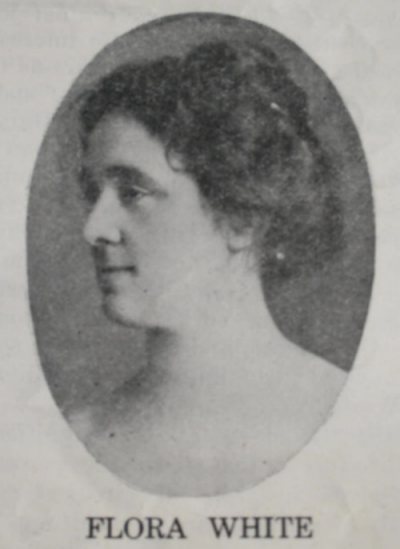
MISS FLORA WHITE (1860 - 1948)
Photo courtesy Heath Historical Society, Heath, MA
Flora White was one of Heath's most beloved citizens. She was born in Heath in 1860 and returned to Heath for the summers in 1896. With her sister Mary, Miss White purchased Plover Hill and finally retired to Heath year round until her death in 1948.
Miss White was interested in the religious well-being of the entire community of Heath. She staged an out-of-doors drama pageant based on the story of David & Saul in Heath in 1921. Previously, she had founded St. Faith's Summer School here in 1910.
Miss White was interested in the religious well-being of the entire community of Heath. She staged an out-of-doors drama pageant based on the story of David & Saul in Heath in 1921. Previously, she had founded St. Faith's Summer School here in 1910.
(Above courtesy of Heath Historical Society files in the Old Town House)
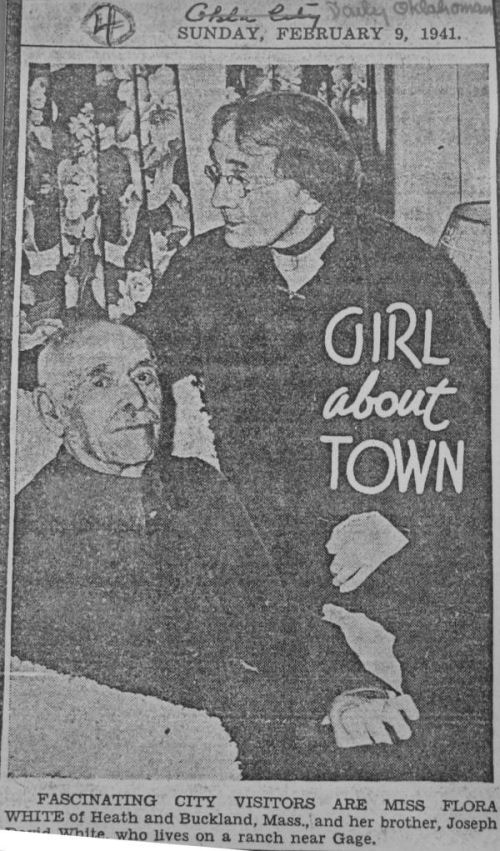
Woodward saved a newspaper clipping about Flora White
MLP
September 2007
The following is a newspaper clipping found in the files of the Heath Historical Society, probably from the Greenfield Recorder, but the exact source could not be found.
Poetess, Educator Lives Quietly In Retirement
Tucked away in her blue and white bedroom in a Greenfield nursing home is a woman, almost 90 years old and almost blind. The friend of many writers and educators, she has been a guest of the famous and nobility in past days, but she is unknown to the average Greenfield resident.Of Gertrude Stein appearance, with clipped gray locks, Miss Flora White, poet, novelist, dramatist, former physical culturist and student of psychology and philosophy, has lived in the Parks Home on Shelburne Road nearly two years. She was born in Heath, the daughter of Joseph and Harriet White. Indicative of the times when this colorful woman began writing is that she used a nom de plume, and typical of her nature was the fact that she called herself "George Heath."
After the death of her father, about the time of the Civil war, Mrs. White and her infant daughters moved to Shelburne Falls for a short time and then returned to Heath where they bought the little house now used as the church parsonage. For many years after leaving Heath they were the guests of Rev. Esty of Amherst. Miss White and her sister received most of their schooling in Amherst before they attended teachers college in Westfield.
Very Athletic
One of Flora White's most distinctive features is that until she was 80 years old, she was considered the most athletic woman in the country. Although there is a cane leaning against her door, her appearance is still far from feeble and more that of a woman in her late sixties. As part of her interest in physical education, she introduced the culture to the Westfield teachers college when she returned there as a teacher.As an educator Miss White began by opening a small day school on School Street in Springfield; and among her pupils, she recalled Archibald Galbraith, now headmaster of Williston Academy. Shortly after she organized a school in Concord which was known for almost 20 years as Miss White's Home.
It was under the pen name "George Heath" that she sold a story to Harper's magazine, not long after finishing school, and with the money paid her passage to Sweden. She received her diploma from the School of Pedagogery in Naas, a suburb of Gothenburg where she was a guest of the head of the school. This man, she related, was the king's most intimate friend, and through him she met Sweden's king. Norway was part of Sweden when she was a temporary resident, and at the time there was talk about it becoming a separate country.
Work in Anthology
She visited most of the European countries and lived for a short time in Wales where she traveled because of her sister's health. In her room at Parks she has a slim black book upon which is written in gold letters, "Poems by Mary A. White and Flora White." The book, published in 1939, is a memorial to Mary, her late sister.Flora White, herself, has enough poems to fill a volume, and notice recently was made public of an anthology of post-war verse with her name among the poets.
"Bloodroots in the Wake of Circumstance" is the name of Miss White's novel. The cover comment read, "The title is a significant symbol of those life forces that have the power to maintain themselves in spite of circumstances. These forces here described are conspicuously psychic, whether tragic in outcome or triumphantly sacrificial." The book aroused the enthusiastic interest of such distinguished authors and philosophers as G. Stanley Hall, President of Clark University, and William James, Professor of Psychology at Harvard, who read its first draft more than 50 years ago.
Drama Drew Thousands
Miss White's "Drama of David" presented in Heath at the end of World War I, was the subject of critics from New York and Boston, and was attended by thousands from this part of the state. It ran for several days and was an outdoor performance.Miss Mary Champney of Westside took the part of Saul, Miss White recalled, and Herbert Ware of Shelburne Falls was Goliath. The proceeds were used for the poor overseas.
Miss White, who is a cousin to the famous Robert Strong Woodward, has among her relatives and ancestors many notables, including Rev. William Williams of Hatfield, the brother of Isaac Williams who founded Williams college.
"But there is something more," she said, when asked about other claims. "I was one of the first persons in this part of the United States to have my appendix removed."
PUBLISHER'S ANNOUNCEMENT
(Found in the files of the Heath Historical Society)
BLOODROOTS IN THE WAKE OF CIRCUMSTANCE
This dramatic and somewhat startling story is, we are told, pure fiction so far as the characters are concerned. But on the other hand we are assured that the experiences involved as well as the scenes depicted are absolutely factual.
Perhaps it is for this reason that it aroused, when first written the enthusiastic interest of such distinguished authors and philosophers as G. Stanley Hall, President of Clark University and William James, Professor of Psychology at Harvard, who read its first draft about fifty years ago.
Letters to the author are still extant, not only from these two famous men but also from many of the foremost literary critics of that day. Among these were Horace Scudder of Boston; Samuel Bowles of Springfield, Mass.; George William Curtis of Harper's Magazine, New York; and Havelock Ellis of England. All of these and many others equally competent expressed keen interest in the literary work of Flora White.
The title "Bloodroots" is a significant symbol of those life-forces that have the power to maintain themselves in spite of circumstance. These forces here described are conspicuously psychic, whether tragic in outcome or triumphantly sacrificial.
The development of events keeps the thoughtful reader's interest vividly alert and it is quite obvious that the more active the mind of the reader the greater will that interest be.
Nevertheless this novel is by no means without humor and at times has a fascinating light touch.
(Found in the files of the Heath Historical Society)
BLOODROOTS IN THE WAKE OF CIRCUMSTANCE
BY FLORA WHITE
This dramatic and somewhat startling story is, we are told, pure fiction so far as the characters are concerned. But on the other hand we are assured that the experiences involved as well as the scenes depicted are absolutely factual.
Perhaps it is for this reason that it aroused, when first written the enthusiastic interest of such distinguished authors and philosophers as G. Stanley Hall, President of Clark University and William James, Professor of Psychology at Harvard, who read its first draft about fifty years ago.
Letters to the author are still extant, not only from these two famous men but also from many of the foremost literary critics of that day. Among these were Horace Scudder of Boston; Samuel Bowles of Springfield, Mass.; George William Curtis of Harper's Magazine, New York; and Havelock Ellis of England. All of these and many others equally competent expressed keen interest in the literary work of Flora White.
The title "Bloodroots" is a significant symbol of those life-forces that have the power to maintain themselves in spite of circumstance. These forces here described are conspicuously psychic, whether tragic in outcome or triumphantly sacrificial.
The development of events keeps the thoughtful reader's interest vividly alert and it is quite obvious that the more active the mind of the reader the greater will that interest be.
Nevertheless this novel is by no means without humor and at times has a fascinating light touch.
(Courtesy of the Heath Historical Society)
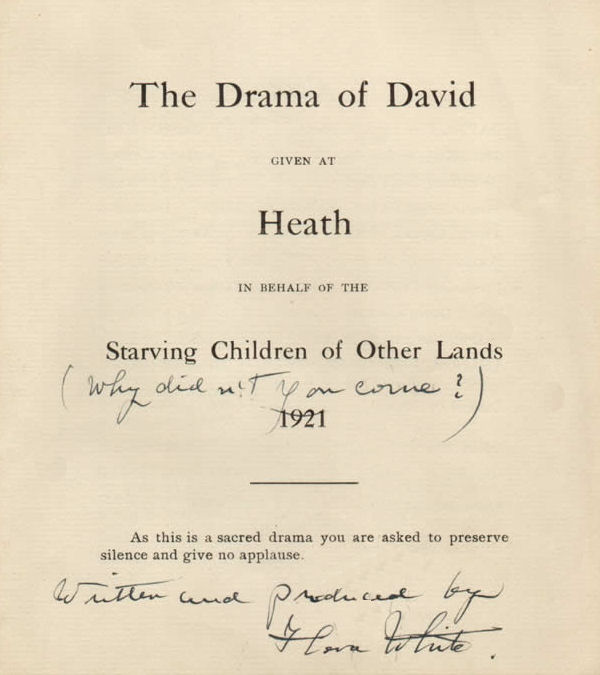
Program for "Drama of David," a play written by Flora White
signed by Flora Whilte to Robert Strong Woodward
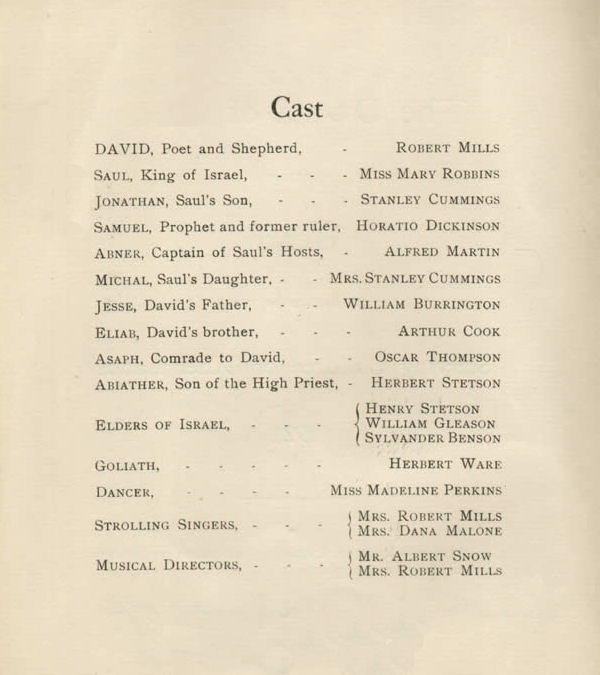
Cast list from the progam for "Drama of David" by Flora White

Scene list from the progam for "Drama of David" by Flora White
Essay by Grace Moyer Share about her aunt Flora White and Robert Strong Woodward
(Courtesy Heath Historical Society, Heath, MA)
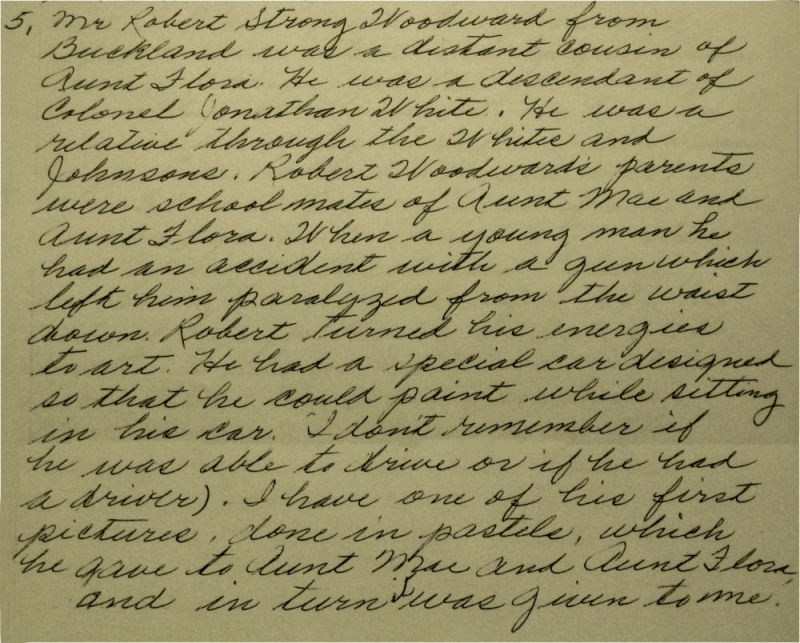 "Mr. Robert Strong Woodward from Buckland was a distant cousin of Aunt Flora. He was a descendant of Colonel Jonathan White. He was a relative through the Whites and Johnsons. Robert Woodward's parents were school mates of Aunt Mae and Aunt Flora. When a young man he had an accident with a gun which left him paralyzed from the waist down. Robert turned his energies to art. He had a special car designed so that he could paint while sitting in his car. I don't remember if he was able to drive or if he had a driver. I have one of his first pictures, done in pastels, which he gave to Aunt Mae and Aunt Flora and in turn it was given to me."
"Mr. Robert Strong Woodward from Buckland was a distant cousin of Aunt Flora. He was a descendant of Colonel Jonathan White. He was a relative through the Whites and Johnsons. Robert Woodward's parents were school mates of Aunt Mae and Aunt Flora. When a young man he had an accident with a gun which left him paralyzed from the waist down. Robert turned his energies to art. He had a special car designed so that he could paint while sitting in his car. I don't remember if he was able to drive or if he had a driver. I have one of his first pictures, done in pastels, which he gave to Aunt Mae and Aunt Flora and in turn it was given to me."A NEW ENGLAND ARTIST
One of Those Who Deserves a Greater Recognition
To the Editor of the Republican
Your admirable clipping of May 29, under the caption "American Art" contained a statement both stinging and pertinent: "The American people as a whole do not realize that their painters rank among the greatest in the world today." This statement was supported by a quotation from Rodin: "There is now going on in America a renaissance more important than that of the 15th century in Europe, only the Americans do not know it."
We have frankness here to the point of brutality, but also a truth that it might be difficult to controvert. If we have an American culture that applies to America as a whole it obviously does not include a quick and sensitive appreciation of the creative arts. We have just had in Western Massachusetts an extraordinary exhibition of drawings and paintings by a master that has no equal in his own particular field--that of the New England landscape.
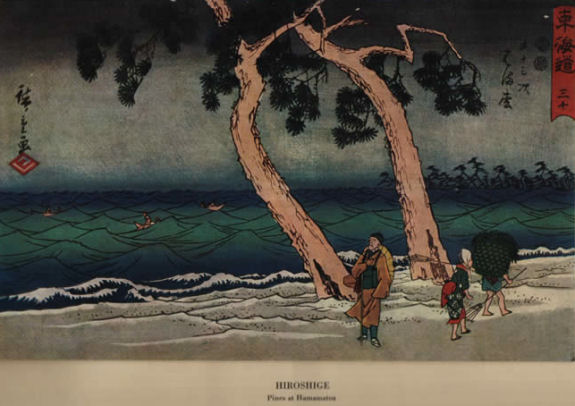
Pines at Hamamatsu by Hiroshige
Robert Strong Woodward has discovered and portrayed reality as revealed in the skies and hills and streams of New England; he has portrayed it with the profound integrity that one finds in Hiroshige's "Pines at Hamamatsu." In that masterpiece the two pines not only dominate the scene but they appear to create it; their very speech and plaint vibrating from the thin wash of the Japanese print in touching cadence.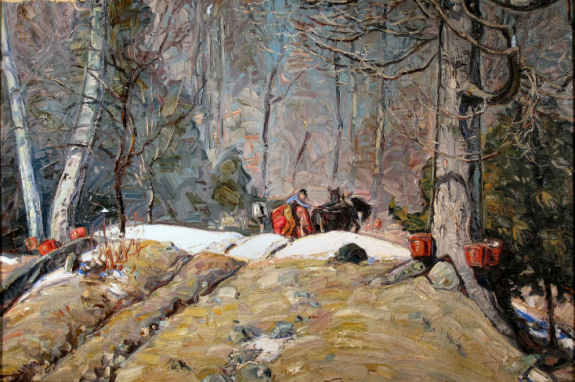
When Drifts Melt Fast - Editor's note: we believe the painting to which Flora White refers is actually "When Drifts Melt Fast," or the very similar "Gathering Sap," not "When Sap Runs." Both are paintings of sugaring time, but there are no horses in "When Sap Runs." MLP.
Woodward has a canvas called "When Sap Runs" -- a brilliant work -- full of the vitality and rhythm of spring surgings, red buckets on gray trunks, horses in the distance dragging their load of gathered sap-- sunshine, promise, flickering through the leafless branches--but the inner meaning of the scene is conveyed in the deep irregular ruts of the foreground which the load has left in its trail. Two pictures could hardly be more dissimilar in their external markings then "Pines" of Hiroshige and the "Sap Runs" of Robert Woodward who did not perceive that in essence they are one, and that neither could have been produced except by a great landscape painter.
Henri Matisse says: "An American should learn his metier and work in America"; Woodward has learned his metier and he works in New England--nowhere else. Perhaps that is the cause of his unequalled achievement. But why not face the European criticism with candor and ask ourselves to what extent such works of genius form an essential part of the lives of the majority of our educated people? Is it true, as is freely claimed abroad, that out culture consists of bath tubs and automobiles with only the movies for esthetic satisfactions? If there is a measure of extravagance in such comments one feels there may be also a measure of justification. Who can honestly deny that usually the well-to-do American feels a less imperative need to have life interpreted for him by great works of art than he does to possess more bathrooms and the latest model in motor car?
To return to the criticism first quoted, that we do not know that our great painters are great, one is reminded of a notable painting--perhaps one of the most significant of this century--the work of a young Concord artist, Henry Brooks. It was exhibited in Boston, New York, Philadelphia, without eliciting a word of comment from a single American critic, yet it was one of the first selected by a French connoisseur to reproduce for the art world of Paris, as exhibiting the high achievement being attained by American painters, and columns were devoted to it in a leading art journal there.
The situation seems a bit tragic and a bit anomalous. We can produce great art but we cannot produce sufficient sensitivity and appreciation for its maintenance. Perhaps the youth movement, of which we hear so much, will develop a higher type of desires until the fostering genius and the promotion of noble works of art becomes the passion of our people. When that time comes we may justly claim to possess an American culture.
FLORA WHITE
Heath, Mass., June 3, 1931
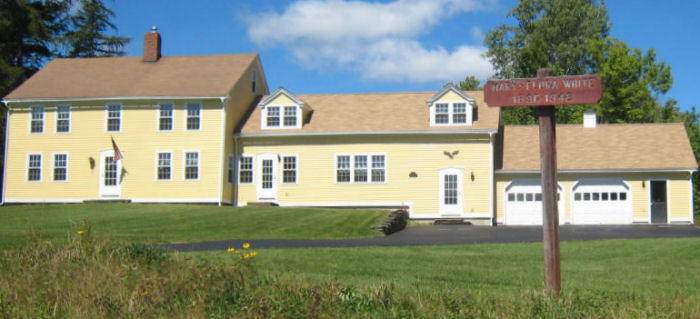
Flora White's house in Heath as it appears in 2007.
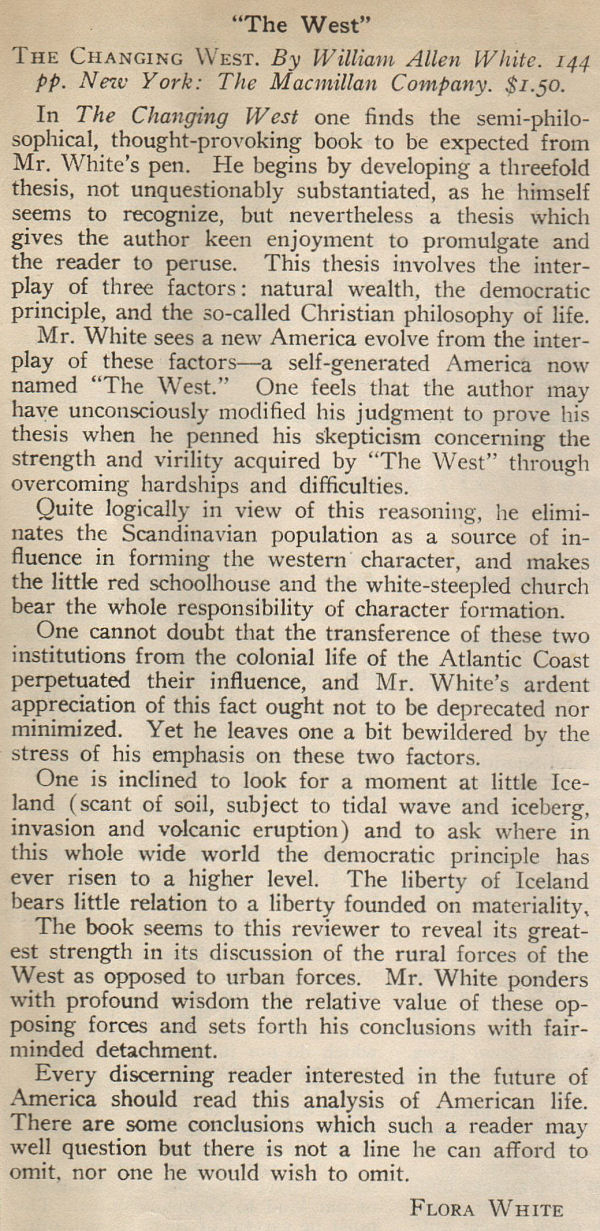
Flora White's review of the book "The Changing West" by William Allen White
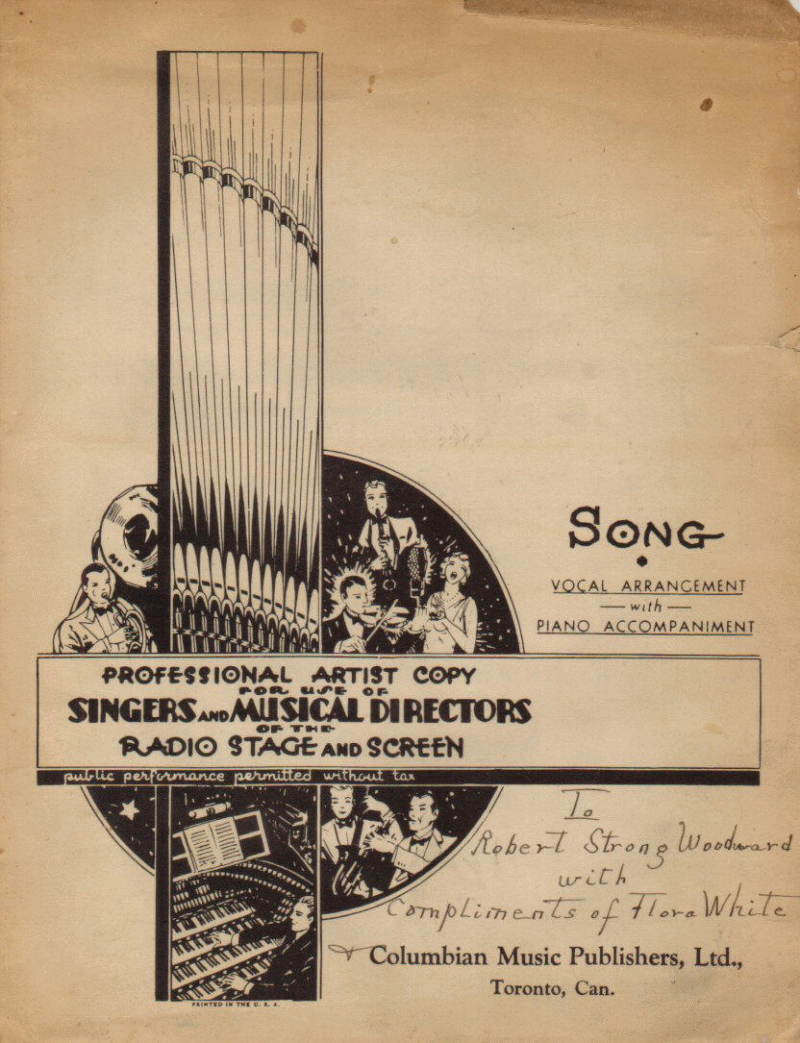
Sheet music for Light and Shadow, a song by Flora White
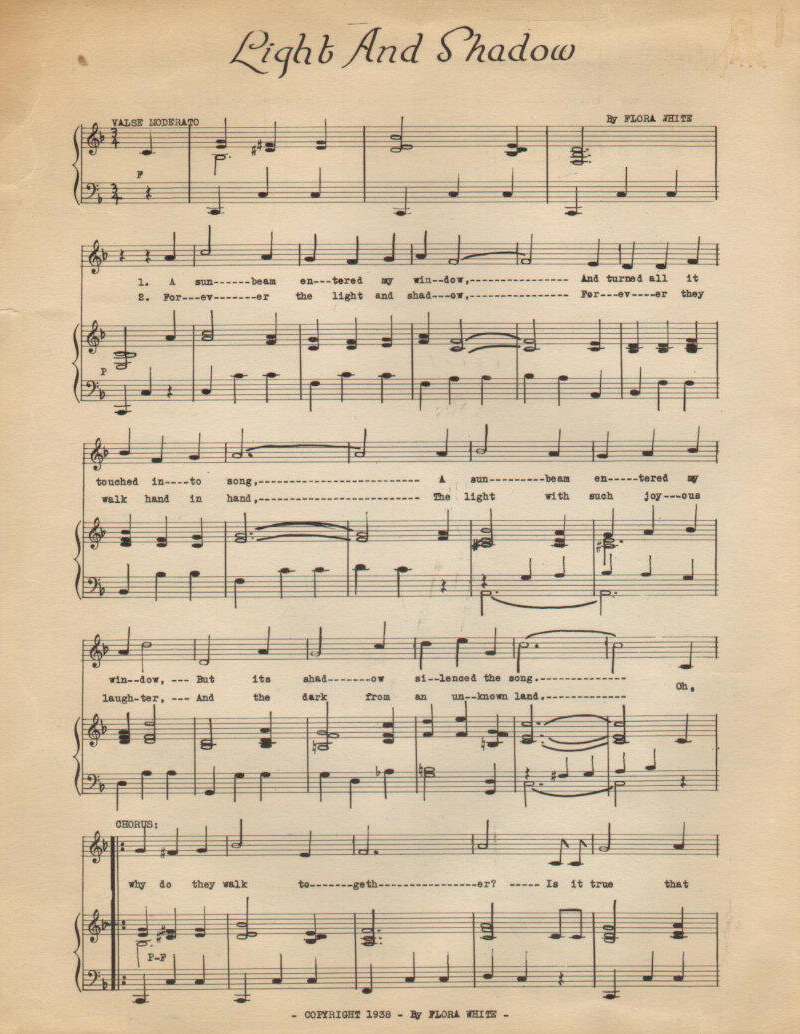
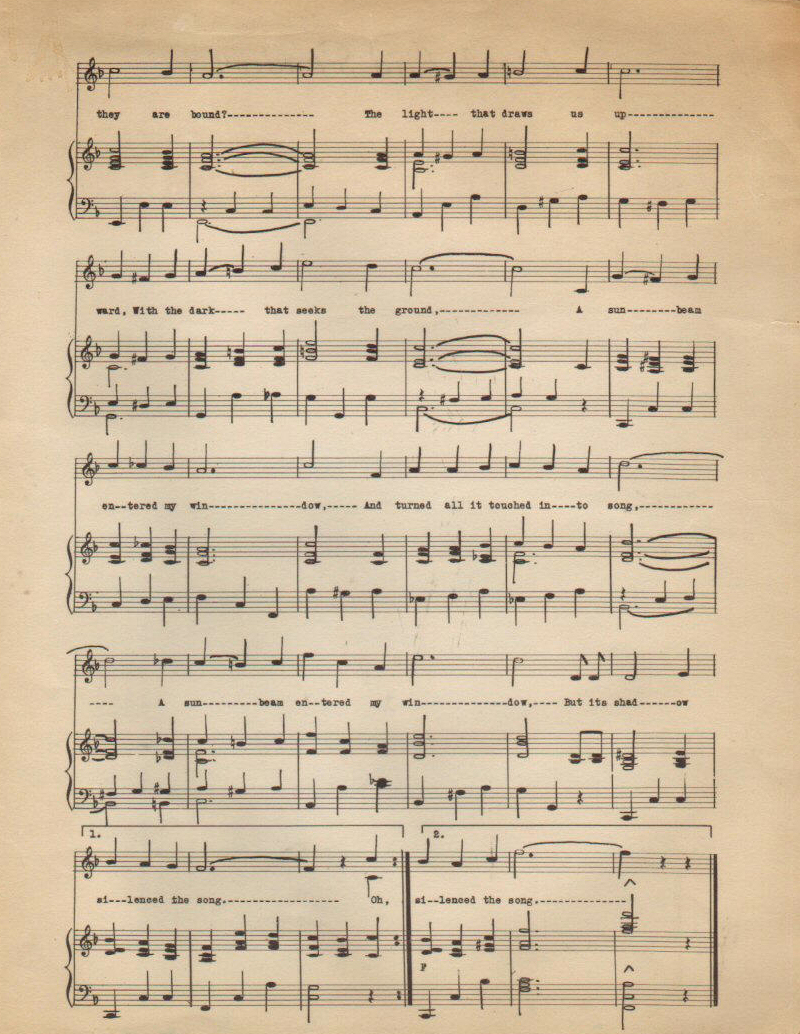
Public Domain

Flora Whilte obituary from the Greenfield Recorder
Click here to view the "Find a Grave" obituary of Flora White MLP
March 2010

